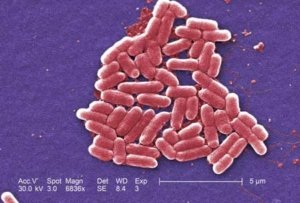The E. coli outbreak associated with Philadelphia restaurants has expanded to include 16 people with Shiga toxin-producing E. coli (STEC) infections. Announced last week by city health officials, the outbreak includes cases associated with multiple restaurants reported since August 30, 2019.
Public health officials have been interviewing case patients, who range in age from 7 to 90 years old, to gather information about which foods all of them ate during the exposure window. They are not ready to name restaurants that may be involved, according to a report in the Philadephia Inquirer. But that doesn’t necessarily rule out legal options for case-patients. The public disclosure of brand names or restaurant names is not required to file a lawsuit.

E. coli bacteria under a magnification of 6836x
Food becomes contaminated with E. coli via the fecal-oral route, meaning people eat food that is contaminated with fecal matter containing E. coli bacteria. This can happen at any point in the food production chain when an infected food worker does not wash hands properly after using the bathroom if soil or water used to grow produce is contaminated, or during the slaughter of animals. Recent E. coli outbreaks have been linked to ground beef and romaine lettuce.
The E. coli strain associated with this outbreak produces a kind of poison called Shiga toxins that result in more severe illnesses than infections from other strains. One life-threatening complication associated with STEC is a form of kidney failure called hemolytic uremic syndrome (HUS). Teenagers and young children are most at risk of developing HUS.
Pritzker Hageman E. coli lawyers represent people nationwide who have been sickened by contaminated food. If you are part of this outbreak, we want to represent you, too. For a free consultation, call us at 1-888-377-8900, text us at 612-261-0856 or, fill out the form below.
